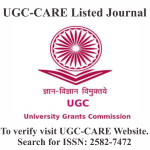THE ROLE OF ENGLISH IN INDIA’S LITERARY FESTIVALS AND CULTURAL DIALOGUES
DOI:
https://doi.org/10.29121/shodhkosh.v5.i1.2024.4166Keywords:
Indian English Literature, Postcolonial Identity, Linguistic Hybridity, Code-Switching, Cultural Negotiation, Colonial Legacy, Language Appropriation.Abstract [English]
Language is one of the most important components of identity and power, which plays diverse roles, especially in postcolonial countries, because people’s language use divulges historical, cultural, and even political contexts. Indian English literature is a good example of this; writers recreate themselves and the postcolonial world through the English language, which they were oppressed with. Hence, instead of perceiving the use of English as a colonial imposition, Indian English writers have made it very vibrant and resonant for cultural representation and Indian identity construction in today’s globalised world. Indian English literature is known for using code-mixing, code-switching and incorporating the local dialects, as India is a multilingual and socially diverse nation. This way, it is possible to achieve the representation of Indian ethos in literary works and mould tradition and modernity. Salman Rushdie, Arundhati Roy, Vikram Seth, as well as Jhumpa Lahiri also use language not only as narration as a linguistic means for imparting narrative but also as a platform to create further messages concerning displacement, biculturalism, the marginalisation of the Indian society and the possible modes of fighting it, respectively. In this paper, I am going to analyse how these Indian English writers employ language to claim their ethnic alterity to the English language, as well as to resist social hierarchy systems from local and global perspectives and represent the diversification of Indian regions. This creed of cultural intertwining and the role of language as a mediator between the spiritual and the material, the people’s past and present, and regional and global tendencies become evident in the selected literary works. By making their English Ian English, Kureishi and others seek to revitalise the language in Indian writing in English, which, in response, writes back to the imperialist language and successfully makes it a democratic language of the oppressed.
References
Asnani, S. M. (1979). Indian Writing in English. Indian Literature, 22(1), 5-12. DOI: https://doi.org/10.2307/40133260
Puchner, M. (2014, March 24). World Literature, Indian-Style. Inside Higher Ed.
insidehighered.com
Chowdhary, R. (2024). Shifting Paradigms of Multilingual Publishing and Scholarship in India. The Journal of Electronic Publishing, 27(1). journals.publishing.umich.edu DOI: https://doi.org/10.3998/jep.5592
Søndergaard, C. S. (2019). From Independent Publishers to Literary Festivals: Exploring the Danish Literary Field. Leviathan: Interdisciplinary Journal in English, 5(1), 111-126. tidsskrift.dk
University of Washington Bothell. (2024, September 12). The gem of literary festivals. UW Bothell News. uwb.edu
Carolina Performing Arts. (2024). Jaipur Literature Festival-North Carolina.
carolinaperformingarts.org
Iyer, P. (2024, January 27). The Mahabharata of Literary Festivals. Air Mail.
airmail.news
Al Jazeera. (2014, January 16). Literary festivals flourish in India. Al Jazeera.
aljazeera.com
Mehrotra, A. K. (2003). A History of Indian Literature in English. Columbia University Press.
Gokhale, N. (2016). The Jaipur Literature Festival: The Greatest Literary Show on Earth. Penguin India.
Devy, G. N. (2024, November 25). Should a Country Speak a Single Language? The New Yorker. newyorker.com
Tharoor, S. (2017). Inglorious Empire: What the British Did to India. Penguin Books.
Kapur, S. (1998). Elizabeth [Film]. PolyGram Filmed Entertainment.
Dalrymple, W. (2019). The Anarchy: The East India Company, Corporate Violence, and the Pillage of an Empire. Bloomsbury Publishing.
Gokhale, N. (2021). The Blind Matriarch. Penguin Random House India.
Rushdie, S. (2012). Joseph Anton: A Memoir. Random House.
Roy, A. (2017). The Ministry of Utmost Happiness. Knopf.
Sahgal, N. (2015). The Fate of Butterflies. Speaking Tiger Books.
Sinha, M. (2016). The Other Side of Silence: Voices from the Partition of India. Penguin Books.
Seth, V. (2005). Two Lives. HarperCollins.
Desai, K. (2006). The Inheritance of Loss. Atlantic Monthly Press.
Adiga, A. (2008). The White Tiger. Free Press.
Ghosh, A. (2005). The Hungry Tide. HarperCollins.
Downloads
Published
How to Cite
Issue
Section
License
Copyright (c) 2024 Himadri Sarkar

This work is licensed under a Creative Commons Attribution 4.0 International License.
With the licence CC-BY, authors retain the copyright, allowing anyone to download, reuse, re-print, modify, distribute, and/or copy their contribution. The work must be properly attributed to its author.
It is not necessary to ask for further permission from the author or journal board.
This journal provides immediate open access to its content on the principle that making research freely available to the public supports a greater global exchange of knowledge.




















